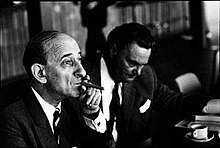Raymond Aron
French philosopher, sociologist, journalist, and political scientist (1905–1983)
Raymond-Claude-Ferdinand Aron (14 March 1905 – 17 October 1983) was a French philosopher, sociologist, journalist, and political scientist.

Quotes
edit- The optimism of the Left was created and maintained by a strong feeling: admiration for the power of reason, certainty that the application of science to industry would revolutionise the order of human society and the condition of its individual members. The ancestral aspiration towards human brotherhood was united with faith in practical science in order to inspire either nationalism or socialism or both.
- The Opium of Intellectuals (1955), Conclusion: The End of the Ideological Age?
- The man who no longer expects miraculous changes either from a revolution or from an economic plan is not obliged to resign himself to the unjustifiable. It is because he likes individual human beings, participates in communities, and respects the truth, that he refuses to surrender his soul to an abstract ideal of humanity, a tyrannical party, and an absurd scholasticism. . . . If tolerance is born of doubt, let us teach everyone to doubt all the models and utopias, to challenge all the prophets of redemption and the heralds of catastrophe. If they can abolish fanaticism, let us pray for the advent of the sceptics.
- The Opium of Intellectuals (1955)
- The intellectual ... must try never to forget the arguments of the adversary, or the uncertainty of the future, or the faults of one’s own side, or the underlying fraternity of ordinary men everywhere.
- The Opium of Intellectuals (1955)
Quotes about Aron
edit- In short, Raymond Aron was a perfect bourgeois. I use the term invented by liberal democracy's critics and enemies to describe the kind of man typical of it. He was reasonable, immune to the great romantic longings in the light of which the present is denigrated and sensible calculation about the future is made to appear small-minded. Such a man is a reflective rather than a passionate patriot, a good husband and father whose attachment to the smaller community attaches him more securely to the larger one, and, above all, he believes in the liberating power of education.
- Allan Bloom, "Raymond Aron: last of the liberals", The New Criterion (September 1985)
- What strikes me as particularly undeniable is that the absence of the feeling of belonging to a class is characteristic of children of the bourgeoisie. People in a dominant class position do not notice that they are positioned, situated, within a specific world (just as someone who is white isn’t necessarily aware of being so, or someone heterosexual). Read in this light, Aron’s remark can be seen for what it is, the naive confession offered by a person of privilege who imagines he is writing sociology when all he is doing is describing his own social status. I only met him once in my life, and immediately felt a strong aversion towards him. The very moment I set eyes on him, I loathed his ingratiating smile, his soothing voice, his way of demonstrating how reasonable and rational he was, everything about him that displayed his bourgeois ethos of decorum and propriety, of ideological moderation. (In reality, his writings are filled with a violence that those at whom it is directed would not be able to avoid feeling were they ever to come across it. It suffices to read—but there are other choices too—the pages he wrote about the working-class strikes in the 1950s. People have praised his lucidity because he was anticommunist while others still blindly supported the Soviet Union. But this is wrong! He was anticommunist because of his hatred of the working class, and he set himself up as the political and ideological defender of the bourgeois establishment, defending against anything having to do with the aspirations or the political activities of the working class. Basically, his pen was for hire: he was a soldier in the service of those in power helping them to maintain their power. Sartre was right a thousand times over to insult him in May 1968. Aron had more than earned it. Let us salute the greatness of Sartre for daring to break with the conventions of polite academic “discussion”—which always works in favor of “orthodoxy,” and its reliance on “common sense” and what seems “self-evident” in its opposition to heterodoxy and to critical thought. Sartre did this at a moment when it had become important to “insult those who are the real insulters,” to recall a helpful reminder Genet offers us, a happy turn of phrase we should always be ready to take up as our motto.)
- Didier Eridon, Returning to Reims (2009) (Translated by Michael Lucey)
- Like the Owl of Minerva, Aron brought wisdom to the French intellectual community in its twilight years; but the belated appreciation of his work and his long isolation have obscured the heroic scale of his contribution to French public life. Aron was no moralist. But his whole career constituted a bet on Reason against History, and to the extent that he has won he will in time be recognized as the greatest intellectual dissenter of his age and the man who laid the foundations for a fresh departure in French public debate.
- Tony Judt, The Burden of Responsibility: Blum, Camus, Aron, and the French Twentieth Century (1998), "The Peripheral Insider: Raymond Aron and The Wages of Reason"
See also
edit
External links
edit